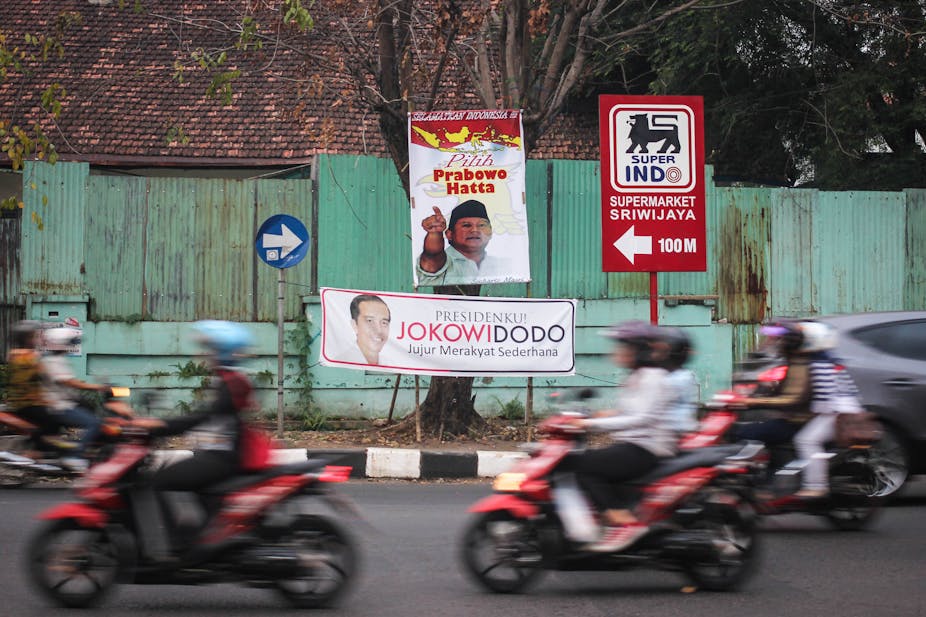Indonesians will next month cast their votes in their third presidential election since the end of president Suharto’s “New Order” regime in 1998.
The new democracy has struggled to establish effective and clean governance. Parts of Indonesian politics have been slow to reform, including the political culture that supports corruption and the vested interests of members of the political, military and business elite.
The big question around the July 9 election is whether it will be able to provide a new kind of political leadership. In Indonesian politics, high-profile figures from the old regime continue to play important roles alongside emerging leaders. In the 2014 presidential elections, voters have a choice between the old and new guard: former military general Prabowo Subianto and Jakarta governor Joko “Jokowi” Widodo.
The candidates
Prabowo is the son of president Suharto’s trade minister and an established member of the political and military elite. He was a protégé and former son-in-law of Suharto. Prabowo is a controversial figure in Indonesian politics. He was removed from his army command following allegations of human rights violations in 1998.
Unlike Prabowo, Jokowi comes from a poor background. He worked his way up to mayor of the mid-sized town of Solo and then to governor of Jakarta in 2012. He has a unique blusukan management style, which includes making unannounced visits to the streets to find out problems on the ground.
Jokowi’s candidacy has been portrayed as an opportunity for Indonesia to break away from the old order. However, this is only partially true. He is backed by the Indonesian Democratic Party of Struggle (PDIP), chaired by former president Megawati Sukarnoputri, the daughter of Indonesia’s first president Sukarno. Nevertheless, Jokowi is a rather unconventional presidential candidate. He has been reluctant to do the big political speeches that are a regular feature of Indonesian politics.
Both candidates have sought to distance themselves from current president Susilo Bambang Yudhoyono, whose popularity plunged in his second term due to high profile corruption scandals and a reputation for indecisiveness. Prabowo has carefully created an experienced ‘strongman’ image with a “firm and decisive” leadership style. Jokowi has stuck to his reputation for listening to ordinary citizens and clean governance.
Corruption is the key issue
According to Transparency International, 89% of Indonesians view the parliament as either corrupt or extremely corrupt. It is not surprising that this was one of the key themes of the first presidential debate held on June 9.
The candidates answered questions relating to democratic development, clean government and legal certainty. Both teams agreed on the importance of improving democracy in Indonesia.
Jokowi, supported by his vice-presidential nominee Jusuf Kalla, argued that democracy is about “listening to the people’s voices”. He suggested reforming political parties to reduce corruption. Subianto, with his vice-presidential nominee Hatta Rajasa, promised to increase the salaries of law enforcers.
While candidates agreed they would strengthen the Corruption Eradication Commission, the debate highlighted the lack of a comprehensive corruption policy from either candidate. This reflects the importance of charisma in Indonesian political culture. Voter recognition is more likely to determine electoral results than developed policy.
A key moment in the debate was when Kalla asked Prabowo how he would resolve past human rights violations. Through Kalla, the Jokowi campaign has been clearly attempting to remind voters of allegations that Prabowo was involved in the kidnapping of pro-democracy activists.
It is unclear how this human rights issue may play out during the rest of the campaign. Many Indonesians have resented the perceived “special treatment” of military leaders regarding the punishment of crimes. However, there is a risk for the Jokowi campaign that focusing too much attention on Prabowo’s past may invoke sympathy among voters.
Economic policies
The second debate on June 15 focused on the economy and welfare. There is little difference in Prabowo and Jokowi’s economic policies. They have both expressed similar beliefs in economic nationalism and protectionism. They have also appealed to the populist idea that there is too much foreign ownership in Indonesia.
During the debate, Jokowi focused on the importance of small business and gave specific examples from his political experience. This approach could backfire if voters do not trust that he has the experience to run the world’s third largest democracy.
Prabowo, on the other hand, focused on broader economic issues, promising to seal budgetary leaks and blaming foreign investors for exploiting Indonesia’s resources.
According to Indonesian newspapers Kompas, The Jakarta Post and The Jakarta Globe, most agreed that Jokowi won the first debate. However, he failed to achieve a ‘knockout blow’. While Jokowi has been the front-runner for over a year, the gap between the two candidates is closing. Some recent polls now have Prabowo ahead of Jokowi.
Jokowi’s style of grassroots campaigning might work in Solo or even Jakarta. However, in a nation of over 190 million registered voters across 6000 inhabited islands, reaching out to the broader nation will be critical.

